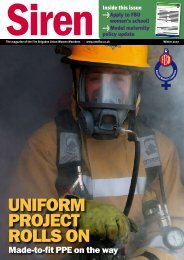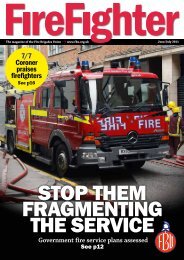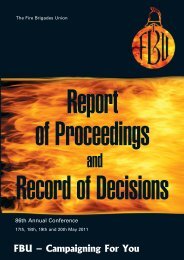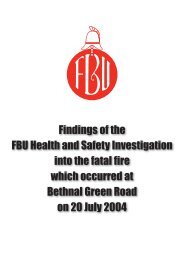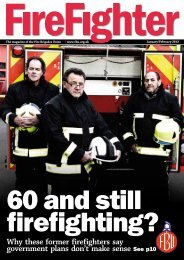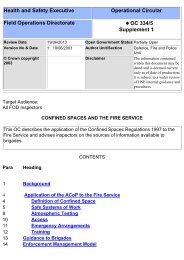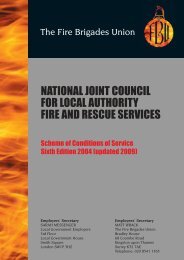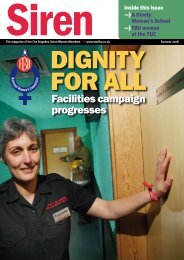Report - Fire Brigades Union
Report - Fire Brigades Union
Report - Fire Brigades Union
You also want an ePaper? Increase the reach of your titles
YUMPU automatically turns print PDFs into web optimized ePapers that Google loves.
SECTION B — FIRE AND RESCUE SERVICE POLICY<br />
question by David Drew to make a statement as to how a<br />
national network was to be kept in place after the ending<br />
of the first set of leases in 2027 and the ending of the<br />
final leases in 2034, simply referred to the Landlord and<br />
Tenant Act.<br />
124)The signing of the PDS contracts at such an early stage<br />
has been catastrophic. No update of the Outline Business<br />
Case was produced before the decision and no more<br />
detailed work had been done on costings, timescales or<br />
the prospects for the technology.<br />
125)A draft Full Business Case was produced in 2006 and<br />
another update in 2007. Another was promised throughout<br />
2008 and eventually appeared. The IPF reports on all of<br />
these are attached.<br />
126)The Institute of Public Finance, in an independent report for<br />
the FBU, said in its assessment of the Private Developer<br />
Scheme (PDS) – the biggest price ‘ticket’ for the whole<br />
project – did not demonstrate value for money. The IPF<br />
also identified a £200 million increase in the total project<br />
costs in the FiReControl Business Case. The overall project<br />
costs did not rise above the £1.4billion identified in the<br />
previous 2007 Draft Business Case because an<br />
assumption was made which cut back on staffing costs by<br />
a further £200 million.<br />
127)Having hastily signed the property contracts, the IT<br />
contracts then waited for more than 18 months to be<br />
signed. There was therefore no chance of the RCC<br />
buildings being operational six months after practical<br />
completion and rents becoming payable.<br />
128)The IT contract was signed in March 2007 after much<br />
delay. As we pointed out earlier, by August 2007 CLG were<br />
already complaining about delays to DCMT1 and<br />
Convergence work. Why CLG expected such complex<br />
work to be completed within a few months has never<br />
been explained, but it was from the summer of 2007 that<br />
concerns about delays started to emerge.<br />
129)Our own response to the Full National Business Case is<br />
also attached. We will not go through that in detail but<br />
attach it as requested. It does raise significant questions<br />
about resilience, call handling capacity and call filtering by<br />
BT and Cable and Wireless Operators.<br />
Where do we go from here – basic principles<br />
130)First, a profound reality check is needed. There is<br />
little confidence left within the fire service that this<br />
project is going anywhere good and it’s not going<br />
anywhere soon.<br />
That is an opportunity to re-think what basic principles<br />
should underpin what happens next:<br />
regional level within a reasonable timescale and<br />
budget;<br />
3. You should only be prepared to take great risks and go<br />
to great expense if there is evidence – not assertion or<br />
mere conviction – that the rewards are so great as to<br />
justify the level of risk being taken;<br />
4. There must be a clear link between the key strategic<br />
priorities of local fire services and any future project<br />
configuration, including agreed measures of success;<br />
5. There must be clear ownership and leadership driven<br />
by the needs of local fire services and not by the needs<br />
of central government;<br />
6. There must be an effective engagement with all key<br />
stakeholders and a re-building of confidence and<br />
cooperation;<br />
7. End-users need to buy in to any future project and not<br />
have it used as an opportunity to drive down their<br />
working conditions or working environment;<br />
8. Project managers must continue to demonstrate skills<br />
and a proven approach to project management and risk<br />
management;<br />
9. There must be an agreed and realistic timetable,<br />
greater cooperation with all stakeholders including<br />
contractors with the aim of achieving a proper<br />
collaborative environment and not a return to a blame<br />
culture and key players being kept apart;<br />
10. Adequate provision of resources and skills to deliver<br />
what is required.<br />
The ten key principles we set out above should apply to<br />
any future configuration of how the benefits required from<br />
future systems are delivered. The key is delivering what<br />
local fire and rescues say they need going forward, utilising<br />
at least some of the work, and possibly some of the RCC<br />
buildings if appropriate.<br />
131)Alternatives to FiReControl are already being explored with<br />
or without the knowledge or cooperation of CLG. Our<br />
preferred option, on the basis of speed, cost and<br />
confidence in it as a solution, is to utilise upgraded existing<br />
controls.<br />
132)This is not a ‘do-nothing’ option. The union is also prepared<br />
to consider any Business Case presented which considers<br />
other options. We would urge that under any other options,<br />
including RCCs, if government does press ahead.<br />
133)A decision to press ahead regardless does not make<br />
success a certainty. The technology may never be made to<br />
work in the way required of it.<br />
1. There are political limits to how far local democratically<br />
controlled fire services are prepared to go towards<br />
regionalisation;<br />
2. There are technical limits to what can be achieved at a<br />
72 FBU Annual <strong>Report</strong> 2011





